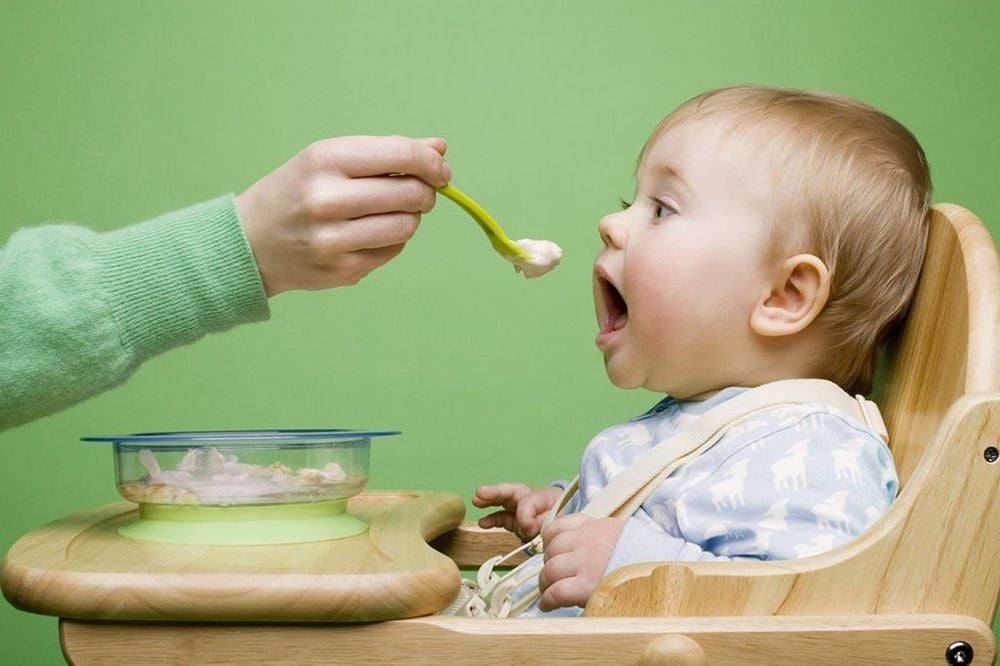This is an automatically translated article.
Constipation is defined as when a child has hard stools and fewer bowel movements than usual. Many parents experience constipation when their baby starts solids. So what is the cause of constipation in children eating solid foods?1. What is constipation?
Constipation is one of the most common digestive disorders in children. A child is diagnosed with constipation when they have hard, dry stools and fewer bowel movements than usual.Signs that your child is constipated include:
Passing less stool than usual. Constipation is usually defined as fewer than three bowel movements a week. The number of bowel movements can be different for each child. Just a change from a child's daily bowel habits is enough to warn of abnormalities and attract the attention of parents. Hard stools, sometimes larger in size. Defecation is difficult and painful, and can even cause anal fissures and bleeding. Time for each bowel movement is prolonged Some young children may cry, stiffen when defecating
2. Why do weaning babies get constipated?
Unlike toddlers, constipation is rarely a problem for babies who are exclusively breastfed, or formula-fed. If a breastfed or formula-fed infant is constipated, parents should take the baby to the doctor right away. This could be a sign of an underlying medical condition or an intolerance to an ingredient in breast milk or infant formula.Weaning is the follow-up phase after a long period of time a baby is breastfed. The transition from a milk-only diet to solid foods will result in all sorts of changes.
For nutritionists, constipation is a common problem in toddlers. This is a concern for most parents at this stage, but it really isn't a big deal.
2.1 Baby's digestive system has not yet adapted to new foods Normally we will observe important changes in stools when we introduce solid foods to babies, including: Color, smell, quantity, baby's bowel movements... Sometimes mothers can see a whole bunch of food in their diapers. These are all normal manifestations as your baby's digestive system "learns" and adapts to eating whole foods.
2.2 Introducing solids too early In many cases, constipation in the age of children can be because the baby is not ready but the mother hastily introduced solids or fed too much. This causes the child's digestive system to be "overloaded" and lead to constipation.
2.3 Children are dehydrated In the process of weaning, the child's digestive system is having to adapt to new foods, plus the lack of water will lead to dry, hard stools that are difficult to push out. accumulation causes long-term constipation in children.
Therefore, in the age of weaning to avoid constipation, parents should also pay attention to the use of water in weaning and the need for water in children according to age.
2.4 Lack of fiber in the weaning diet In addition, the cause of constipation in weaning children can also be because the child does not get enough fiber from the diet. At that time, parents need to pay attention to add foods rich in fiber such as green vegetables and fruits or try giving your baby whole grains.

Thiếu chất xơ là một trong các nguyên nhân trẻ ăn dặm bị táo bón
3. What should be supplemented for children to eat to prevent constipation?
A healthy diet and frequent changes in foods offered to toddlers is always a good strategy to prevent constipation.3.1 Iron The foods in the diet of new babies should be rich in iron. This is an important nutrient and one of the reasons to start introducing solid foods around 6 months of age.
If you give your child iron-rich cereals, you may find your child prone to constipation. Therefore, it is advisable to change food sources rich in iron including: Meat, fish, eggs, nut butters, legumes, tofu... (and infant cereals).
If your child is taking iron supplements, talk to your doctor about the possibility of reducing the dose and remember to discuss the pros and cons of continuing to take the supplement.
3.2 Fiber and vitamins Besides the importance of iron-rich foods, fruits and vegetables should also be part of a baby's meal. Fruits and vegetables are high in vitamin C, which helps with iron absorption. They also provide useful fiber to prevent constipation.
Fiber is essential to help form stools in the digestive tract. As with other nutrients, it's always a good idea to diversify your sources of fiber. In addition to fruits and vegetables, other sources of fiber include ground nuts, whole grain products such as toast, cooked legumes and beans...
All of these foods are They are great foods to introduce because, not only are they a good source of fiber, but they taste delicious, are nutritious, contribute to a varied diet and your baby will love them.
3.3 Liquids Liquids here include: Water (filtered water, fresh fruit juices), breast milk and formula
Continue breastfeeding or formula feeding, and give your baby clear liquids meal. Nutritionists recommend that children only drink cow's milk when they are 9 months old. Breast milk or formula can be continued during the initiation of solid foods.
The liquid that babies drink ensures that their stools are not too dry, making it easier to pass stools.
Parents can refer to some fruits that can be made juice for children such as: Apples and pears... These are all fruits containing fiber. It will help the baby to defecate more comfortably and comfortably.

Trẻ mới tập ăn dặm bị táo bón khiến nhiều bậc cha mẹ lo lắng
4. Things to avoid when a toddler is constipated
4.1 Fiber powders Avoid giving your baby fiber powders (baking powders) such as Metamucil TM or protein powders that contain fiber. These are not for young children. They can also make your child too full to eat any other food.4.2 Take Probiotics Based on the latest recommendations of the North American Society of Pediatric Gastroenterology, Hepatology and Nutrition (NASPGHAN) and the European Society of Pediatric Gastroenterology published in 2018, they do not recommends the use of probiotics to treat infant constipation.
4.3 Laxatives and Other Medicines Dietitians recommend that parents see their doctor before trying any over-the-counter (OTC) treatments for your child.
A baby's digestive system is still maturing and more sensitive than an adult's. Some laxatives and remedies can harm your baby if not used correctly. Therefore, guidance from your trusted doctor is very important.
Parents should keep in mind that preventing constipation is easier than treating it. Consult your doctor for appropriate treatment for your baby. In addition, in the weaning age to improve taste, eat well, reach the right height and weight, and exceed the standard, have a good immune system, strengthen the resistance to get sick less often and have less digestive problems. ... baby needs to add necessary micronutrients: Zinc, selenium, chromium, vitamins B1 and B6, ginger, acerola fruit extract (vitamin C),...
Also according to leading nutrition experts Nutrition recommends that parents need to be calm and persistent when supplementing with nutrients, even through food or functional foods. In particular, the use of functional foods should choose those of natural origin that are easily absorbed, do not allow simultaneous use of many types or continuously change the types of functional foods.
Besides, nutrition experts also emphasize on the role of biological zinc; Parents should learn and supplement zinc for children properly at the appropriate time, to avoid zinc deficiency affecting the comprehensive development of children.
To have more knowledge about raising children and taking care of children by age, you should regularly visit the website https://vinmec.com and make an appointment with the leading doctors, pediatric experts - Nutrition when visiting the website https://vinmec.com need advice.













